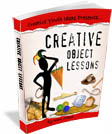Is the excitement of serving God a whole lot of Hoopla – unnecessary excitement and fuss? These games using Hula Hoops are sure to create excitement but can also be used to create discussion on living as a Christian youth within God’s boundaries.
PLEASE SHARE THIS IDEA ON FACEBOOK – CLICK HERE
Games using Hula Hoops
NOTE: If you can’t find hula hoops, plastic tubing can be shaped into a circle and secured with duct tape. For some of the games a circle of rope will also work.
- Antigravity Hula Hoops – 5-10 youth form a circle, putting their hands out in front of them parallel to the floor – index finger extended (as in a kid making a gun). Tell them you will be placing a hula hoop on their fingers and everyone’s index fingers must stay in contact with the hula hoop. The task is to lower the hula hoop to the floor. It will inevitably go up immediately. The only way this works is if they remain calm and there is no blame.
- Hula Hoop Hand Tag – Choose one player to be “It” and 4 additional players for each hoop. Have “It” stand in the center of the Hula-Hoop and the other players outside the circle. The players alternate holding the Hula-Hoop first with one hand and then the other while “It” tries to tap a hand. Those on the outside try to avoid being tapped. The game is over if players drop the hoop. Three rules: 1) the holders must each have one hand on the hoop at all times, 2)the person who is “It” cannot tag a hand that has been lifted from the hoop, and 3) whenever a person is tagged, he or she becomes “It.”
- Hula Hoop Stuff – How many youth can get at least part of their bodies into a Hula Hoop? Count fingers, toes, ears-whatever. Better yet, how many youth can fit inside a Hula Hoop so that their bodies don’t touch the ground outside the hoop?
- Hula Hoop Tag – Spread a few Hula hoops around the ground. The hoops are safe zones where youth cannot be tagged. The idea is to run between the safe havens without getting tagged. Set a time limit on how long people can stay in the safe zones, and make sure you have plenty of space between the hoops.
- Hula Relay – Each youth on a team must take a Hula Hoop and hula while walking or running to a certain point 20 feet or so from the team and back. If the Hula Hoop drops, the player must stop, get the hoop going again, and continue. First team to finish wins.
- Hula Slide Relay – Put the youth in groups of up to four and have each group step inside a Hula Hoop. The youth must move their hoop on the ground from one point to the other. If someone trips and steps out of the hoop, the team has to start over from the beginning.
- Hula Tangled – Gather the participants in a circle and make them hold hands right at the center. Let one person wear the hula hoop on the arm. Without letting go, youth must pass the ring to one another, until it comes back to the person who first had it. Variation: do it without talking.
- Keep the Hula Hoops Up – Every youth needs their own hula hoop. The goal is to keep the hula hoops spinning as possible using the traditional method of swinging it around the waist. A youth is out of the game when their hula hoop completely hits the floor. The last person with their hula hoop moving wins the game. This can also be played in teams.
- Lava Flow – Scatter hula hoops around in a large open space. Everyone playing has found out that the floor has become covered in lava, but only when the leader calls out “lava flow.” In the meantime, the youth are supposed to wander around the room. When “lava flow, 3-2-1” is called, the players need to find shelter inside a hula hoop before the countdown ends. As time goes on, the leader removes hula hoops and the game gets more and more difficult as there are more people per hoop. Feet must touch the ground inside the hoops to be safe and everyone must be safe in order for anyone to win.
- Lion tamer – Youth step through a hoop that get’s progressively higher off the ground – It is similar to limbo but keeps getting higher rather than lower.
- Musical Hoops – This has the same basic rules as the traditional game of musical chairs except no one is ever out. Spread hula-hoops on the floor and play lively, fun music. As you remove the hoops, let the group know that no one is out. Let them figure out that they may share the hoops in order to remain playing. It’s fun to see how many people can share a hoop.
- Sharks – Hula Hoops represent islands. Everyone mills around the sea until SHARKS is called out – then everyone has to get onto an island (in a hoop) to be safe, anyone not on the island is eaten by a shark and so out of the game. Remove islands at your pleasure forcing more and more people out of the game until you have a champ!
- Simon Says – Play traditional Simon Says, but using the hula hoop as a prop. “Simon says• jump in/out of the hula hoop, lift it over your head, put your hand in the hoop, balance it on your foot, etc..”
- Shoes in a Hula-Hoop – You’ll need 4 or more hula-hoops depending on the number of groups you want to have. Each group is given one Hula Hoop. The 4th hula-hoop is placed in the middle of the room and all of the participant’s shoes are placed inside of it. Announce: “The purpose of the game is to have ALL of the ping pong balls in your hula-hoop.” On “go” all the youth will scramble to collect as many shoes as possible. In the midst of the chaos, the leader will stop the game and send people back to their groups to deliberate on how to better capture all the shoes. Continue the game as before. After a while, stop the game again and mention teamwork, and the need to join forces in order to have all the shoes in one’s hoop. The answer to the game is that all of the teams put their hula-hoops together, on top of the Shoe filled hula hoop in the middle of the room.
- Up, Down, Under, Over – This hula hoop game is also for a group of players. Have three or four youth stand inside a large hoop, holding it up at waist level without using their hands. Challenge them to lift the hoop up to their necks or down to their ankles – hands-free. Or, see if they can get the whole group from inside the hoop to outside, without grabbing the hoop or letting it touch the floor.
Main Game – Hula Hoop Circle
Ask the youth to stand in a big circle, slip a hula hoop onto one youth’s arm, and have them all join hands. They then must find a way to move the hula hoop all the way around the circle without letting go of each other’s hands.
Basic rules:
- The object of the game is to pass he hoop around the circle as quickly as possible.
- Youth may not let go of the hands they are holding at any time. If they lose their grip or let go, the hula Hoop must start back at the beginning again.
- Fingers cannot be used to grip or move the Hula Hoop
- The youth must remain in a circle. Players bend and twist their bodies through the hoop to get it around the circle.
- The fastest group wins.
Important Notes:
- Glasses may sometimes fall off and break so those youth wearing glasses need to remove them before the game starts.
- Make sure the hula hoop you use is big enough for everyone in the group to fit through so that there are no awkward moments for larger sized youth.
- Youth should be in generally good shape as some flexibility and balance will be needed to complete the task.
Youth may question whether this challenge is possible, but assure them that it can be done. Repeat the process until the team is satisfied with their time and their system. Generally, groups get it down to less than 2 minutes. The people directly involved work together to fit their body into the hoop and those waiting for the hoop to get to them, watch, give suggestions and encourage. Once it has made it around the circle, the task is complete.
Variations:
- Provide two Hoops for each team. Start the Hoops in the same location but ask the group to pass one in a clockwise direction and the other in a counterclockwise direction. When they get to the midway point there is usually some confusion.
- Time the group as they pass the hoop to see how long it takes them to get it all the way around. Allow another attempt to break the “record”.
- Try to do it as one big group.
- Ask players to stand with their back toward center of the circle.
- Ask the youth to complete the task without talking or while blindfolded.
- Do it sitting down
- They have to pass it 2 persons at a time, 3 at a time?
TAKE IT TO THE NEXT LEVEL
MAKE IT SPIRITUAL
Have you ever heard of the phrase “Jumping through Hoops”? Know what it means?
“Jumping though hoops” has typically meant “going to great lengths” or “much effort” in order to accomplish something.
People jump through hoops on a regular basis. Either to fulfill some kind of requirement to gain acceptance into a group, to meet some kind of standard to satisfy others, to follow some set of rules.
- What are some of the hoops in your life that you have had to jump through?
- Are there hoops we jump through as Christians? In the church? In the youth group?
- What are the expectations for each of these groups?
- Are these hoops good or bad? Explain.
- Do some people have more to deal with than others? If so, why?
- Are hoops necessary? What hoops would you add/remove from/to your life if you could?
- What is the purpose of rules and expectations? How are they useful / harmful?
MAKE IT PRACTICAL
In the Old Testament, the people of God went to great lengths to be accepted by God. To be accepted by God required jumping through a lot of hoops – following a long list of God given laws, and requirements in order to be accepted by God. To make matters worse, by human standards, it was impossible to be accepted by God, because the hoops were beyond the ability of the people. And on top of that, tradition added even more rules and expectations so that by the time Christ had his encounters with the Pharisees, it was an even more impossible burden.
“They tie up heavy, cumbersome loads and put them on other people’s shoulders, but they themselves are not willing to lift a finger to move them.” (Matthew 23:4)
I wonder if any of these hoops sound familiar? Christians must not drink. They must not smoke. They must dress appropriately (according to a myriad of opinions of what is proper). They must be timid, and peaceful and submit when others want to walk over them. Youth cannot have tattoos, or earrings, or unnatural colors in their hair. You must be in church every time the doors are open. You must give to every cause. You must put on a smile even though you are deeply hurting and tired and weary. The list goes on… We sing about grace, yet are quick to condemn, proclaim the blood of Christ in forgiveness, yet hold grudges, preach of freedom in Christ, but add a plethora of rules and expectations. The Bible is full of imperfect people resting in the loving care of a perfect God, many of which would never be allowed in any kind of public position in the church of today. But is a list of rules what defines the Christian? What does define a person as a Christian?
A look at Ephesians 2:1-10 and Romans 5:6-8 makes it clear that Christ loved us and died for us even though we were ungodly, sinful, and dead in our trespasses. We were unworthy, yet God reached out to us.
“Then he said to them all: “Whoever wants to be my disciple must deny themselves and take up their cross daily and follow me.” (Luke 9:23)
MAKE IT PERSONAL
- What are some of the things that you do simply for show?
- In what ways do you conform to expectations?
- How can you personally focus more on the relationships rather than the rules and expectations?
Most people would prefer to follow a bunch of rules, to “jump through hoops” as it were, than to actually give up their own lives and follow Christ. Yet Jesus did not call us to a set of rules, but to a relationship. He asked people to take up their cross and follow Him. But it’s so much easier to carry a hoop than a cross.
“Come to Me, all you who labour and are heavy laden, and I will give you rest. Take My yoke upon you and learn from Me, for I am gentle and lowly in heart, and you will find rest for your souls. For My yoke is easy and My burden is light.” (Matthew 11:28-30)
More Spiritual Lessons from Hula Hoops:
- A circle is a symbol of eternity. It has no beginning and no end.
- Staying in your hula hoop can represent minding your own business and protecting your boundaries.
- We are only responsible for the things God places in our circle of influence.
- When we are properly focused on our own lives, our energy is used to keep our hula-hoop spinning. When we drop it and step out to try to control someone else’s life, our life suffers.
- Will you trust God to take care of the stuff that is outside of your hula-hoop?
- God is inside with us at all times
- In hula hoop you have to find a rhythm to keep it going. We must understand that God has a perfect rhythm set up for our lives. Pushing ahead too fast or lazily moving breaks that rhythm and things fall apart.
- It takes energy to get started
- Momentum helps it keep it going
SCRIPTURE
- “Come to me, all you who are weary and burdened, and I will give you rest. Take my yoke upon you and learn from me, for I am gentle and humble in heart, and you will find rest for your souls. For my yoke is easy and my burden is light.” – Matthew 11:28-30
- “Then he said to them all: “Whoever wants to be my disciple must deny themselves and take up their cross daily and follow me.”- Luke 9:2
- “They tie up heavy, cumbersome loads and put them on other people’s shoulders, but they themselves are not willing to lift a finger to move them.” – Matthew 23:4
- “For it is by grace you have been saved, through faith – and this is not from yourselves, it is the gift of God – not by works, so that no one can boast. For we are God’s handiwork, created in Christ Jesus to do good works, which God prepared in advance for us to do.”- Ephesians 2:8-10
- “You see, at just the right time, when we were still powerless, Christ died for the ungodly. Very rarely will anyone die for a righteous person, though for a good person someone might possibly dare to die. But God demonstrates his own love for us in this: While we were still sinners, Christ died for us.” – Romans 5:6-8
PLEASE SHARE THIS IDEA ON FACEBOOK – CLICK HERE
 MORE IDEAS? See “Creative Object Lessons”
MORE IDEAS? See “Creative Object Lessons”
200 page e-book that explains everything you need to know when planning your very own object lessons. It contains 90 fully developed object lesson ideas and another 200 object lesson starter ideas based on Biblical idioms and Names / Descriptions of God.
![]()



 Description
Description